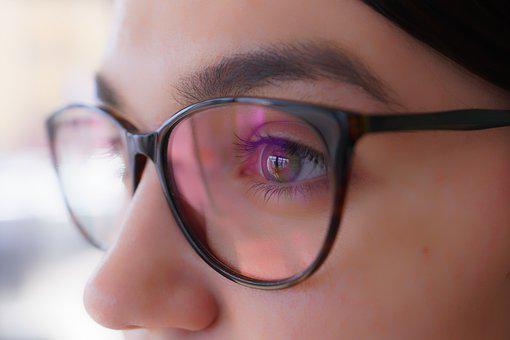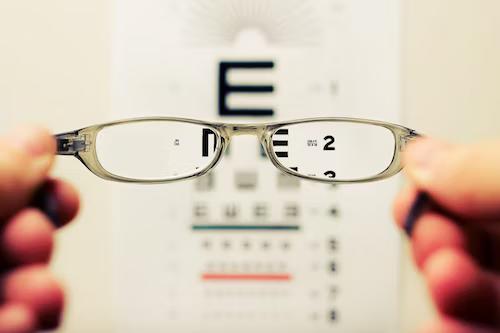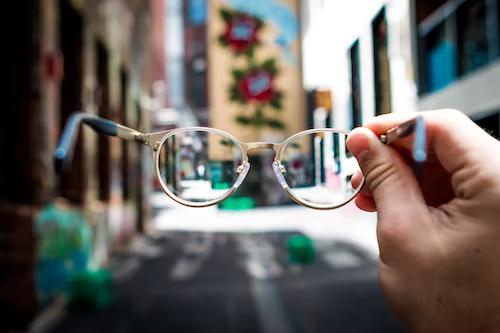Does Wearing Glasses Make Your Eyesight Worse?
Nov 07, 2022
Does Wearing Glasses Make Your Eyesight Worse?
As the times are evolving, we see more and more people relying on eyeglasses to see appropriately. There's a big debate going on right now about whether or not wearing glasses makes your eyesight worse. Some people say that they've noticed their eyesight getting worse since they started wearing glasses, while others swear by the benefits of having corrective lenses. So, what's the truth? Does wearing your glasses make your eyesight worse? Let's take a closer look at the evidence to find out.

Can Glasses Weaken Eyes?
The answer to this question depends on if you have worn glasses correctly.
When wearing glasses correctly
Wearing glasses or contact lenses correctly does not make your eyesight worse. In fact, vision correction can actually improve your eyesight by helping you to see more clearly. However, if you do not wear your glasses or contacts as prescribed, your eyesight may worsen over time. This is because, without vision correction, your eyes have to work harder to focus on images, which can lead to fatigue and strain. Additionally, if you frequently take off your glasses or contacts, you may be causing further damage to your eyesight. When the eye muscles are constantly adjusting to different levels of refraction, they can become weak and less able to function properly. So, not wearing your glasses makes your eyesight worse.
When wearing glasses incorrectly
However, there is a small risk that glasses can weaken eyesight. This is most likely to occur if glasses are not properly fitted or if they are not regularly updated to match changing vision needs. And there are some consequences when wearing glasses incorrectly:
• Dry eyes
• Soreness around the eyes
• Headache
• Fatigue
• Blurry vision
• Tensed shoulders and neck
• Lack of concentration
So, be sure to consult with an optometrist to make sure that your glasses fit properly and that you're wearing them correctly. Doing so can help improve your vision and keep your eyes healthy.
How to wear glasses correctly?
To obtain the full advantage of your eyeglasses, it is essential to wear them in an appropriate and prescribed manner at all times. First, ensure that the glasses' frame is the right size and that you have unobstructed vision through the lenses.
In addition to this, make it a habit to clean your glasses regularly so they remain clear of dust and fingerprints.

Why are Glasses Associated with Worsening Vision?
You may wonder why something that helps you see clearly could be associated with worsening vision. Everybody wants to know, ‘does not wearing glasses make your eyes worse?
It is something incomprehensible, but people believe that wearing glasses might cause the muscles that surround the eyes to waste away. They also say that if you constantly force your eyes to focus without glasses or with a lower prescription than you require, you may stop refractive defects from getting worse over time, but it still is not a proven fact.
If we look closer into the anatomy of the eye, the flexing ligaments in the eye called zonules are responsible for the change in the shape of the natural lens. This further enables the eye to control the amount of light focused on the retina. When the ligaments loosen, it causes the hardening of the lens. It is also a common problem with advancing age.
Is It Good to Wear Glasses all the Time?
Yes, it is believed that your eyesight will only improve by wearing glasses. Most of the time, after getting a new pair of glasses, your brain will go through an adjustment period of up to two weeks, during which it will become accustomed to the new way of visual processing information.
During the first few days or weeks of treatment, it is common for your eyes to feel a bit weary and for you to have some blurriness or doubling of vision. If it doesn’t go away in a few days, the issue might need a follow-up appointment with an optometrist.
Even if your eyeglasses are fixed, you need to visit a specialist once every couple of years who can help you maintain a high level of visual acuity. Your optometrist will monitor the progression of your visual issue and make recommendations for new lens strengths.

Conclusion
After taking into account all of the factors involved, it can be said with certainty that glasses do not cause your eyesight to worsen. In fact, wearing glasses may even help improve your vision in some cases! So, if you’re someone who is hesitant to start wearing glasses because you’re afraid they will make your eyesight worse, don’t worry – you have nothing to lose by giving them a try. And if you already wear glasses, there’s no need to stop now. In fact, you may want to consider getting a new pair of prescription sunglasses to protect your eyes from the sun.
FAQ about Does Wearing Glasses Make Your Eyesight Worse
Does wearing glasses improve eyesight permanently?
No, but it is still a fantastic remedy that provides an instant solution to your eyesight issues without aggravating other symptoms.
Can exercising your eyes lead to better vision?
No. Exercising your eyes helps to relieve this tension caused by close work, such as reading or using a computer. But exercising these muscles cannot instruct your eyes to restructure the lens enough to see properly.
Does glasses make your eyes worse?
No. Those who have vision problem need to understand that not wearing them can pose serious consequences. Just ensure you invest in a reliable pair of readers like Astrid that comes with varying magnification strengths.
Does not wearing glasses improve eyesight?
No. Vision problems are often caused by things like refractive errors, which are best corrected with glasses or contact lenses. Without these corrective measures, the eyes have to work harder to focus, which can actually lead to further vision problems. Additionally, not wearing glasses can put unnecessary strain on the eyes, leading to headaches and fatigue.
